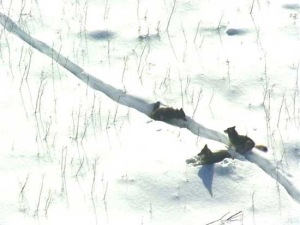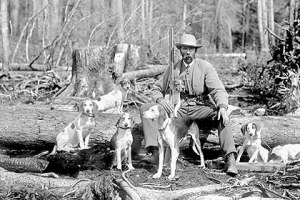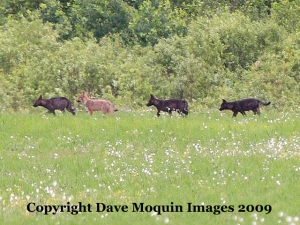Wolves at Crex Meadows, 2009. Photo on WDNR website.
I spent last weekend in Western Wisconsin researching a story for Earth Island Journal. I met with Rachel Tilseth, wolf advocate and author of the informative blog Wolves of Douglas County, as well as members of the Great Lakes Wolf Patrol, a grassroots organization spearheaded by Rod Coronado (formerly with Sea Shepard). The mission of Wolf Patrol, whether in the Great Lakes or Montana, is to document the wolf hunt, educate the public, observe for poachers, and make sure hunts end when they are supposed to.
Their efforts, along with Rachel’s Twitter storm, no doubt influenced Wisconsin’s Department of Natural Resources (DNR) to stop this year’s wolf hunt when they did. There was talk that the hunt would continue longer, as some zones had not killed their quota, even though the overall quota of 150 wolves had been met. The extended season would have allowed hound hunters more time to go after wolves. This atrocious sport, allowed only in Wisconsin, did not legally begin until the regular wolf season ended on December 1.
On the morning of December 4 the DNR still hadn’t made a decision on when to close the hunt. Rachel and Wolf Patrol encouraged their supporters to call the DNR and demand that enough wolves had been killed. A few hours later, it was announced that the hunt would close the next day at noon, allowing for the required 24 hour notice to hunters.

 I spent that final day of the hunt traveling the rough gravel roads
of Wisconsin with Wolf Patrol. The only place we saw hound hunters was
at the local cafe, where they sat for hours, dressed in camouflage,
talking and drinking coffee. It was a relief when noon came and the hunt
was officially over. But as Rod Coronado said, it was a hollow victory,
because the training will continue. Hound hunters can train their dogs
on wolves, bears, coyotes and other animals year round, with no
restriction on pack size. As you can imagine, dogs entering wolf
territory are prime targets as the wolves instinctively protect their
homeland. So far this year, thirty hounds have been killed by wolves.
One can’t help but wonder if the maximum $2,500 payment given to hunters
by the state when dogs are lost to wolves has something to do with
these losses. And one also wonders how many wolves are killed and never
reported during these horrific encounters.
I spent that final day of the hunt traveling the rough gravel roads
of Wisconsin with Wolf Patrol. The only place we saw hound hunters was
at the local cafe, where they sat for hours, dressed in camouflage,
talking and drinking coffee. It was a relief when noon came and the hunt
was officially over. But as Rod Coronado said, it was a hollow victory,
because the training will continue. Hound hunters can train their dogs
on wolves, bears, coyotes and other animals year round, with no
restriction on pack size. As you can imagine, dogs entering wolf
territory are prime targets as the wolves instinctively protect their
homeland. So far this year, thirty hounds have been killed by wolves.
One can’t help but wonder if the maximum $2,500 payment given to hunters
by the state when dogs are lost to wolves has something to do with
these losses. And one also wonders how many wolves are killed and never
reported during these horrific encounters.So although the season is officially over, when fresh snow falls in rural Wisconsin, wolves and other wildlife will continue to face bloody confrontations with hounds as hunters train their dogs year round. Once again, a minority of the population, one that finds entertainment in violent acts, continue their sport in an era when this activity should be known only as a cruel mistake of the past.
source



No comments:
Post a Comment